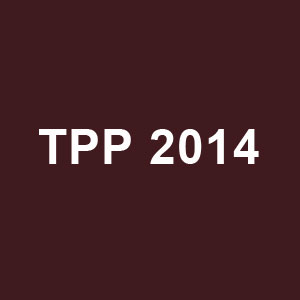Confirmed Keynotes:
Judith Butler (University of California at Berkeley)
Alphonso Lingis (Pennsylvania State University)
Catherine Malabou (Kingston University)
Jon McKenzie (University of Wisconsin–Madison)
Martin Puchner (Harvard University)
Avital Ronell (New York University)
Call for Papers:
In this age of global circulation, the borders that determine and isolate particular domains are becoming ever more fluid, be they physical, cultural or conceptual. This is no less true in academia, notably as regards the relation between philosophy and the performing arts. The distinctions between these two disciplines are being challenged and reevaluated, attributing philosophical qualities to the act of performance while exploring the implications of philosophy in action, philosophy enacted.
Following the success of the international conference “Images and Functions of the Theater in Contemporary French Philosophy” (ENS Ulm, org. CIEPFC, Dimitra Panopoulos, Flore Garcin-Marrou, 10-11/2012), this next conference continues the investigation into the problematic relation between theater and philosophy, this time from an Anglo-American point of view. New crossings and transfers between ideas and the stage, the abstract and the concrete imply a fundamental shift in perspective that unites philosophy and performance. A brand new field is developing, called Performance Philosophy in English and Philo-Performance in French, which studies and encourages the dramatic embodiment of ideas.
An increasing number of events abroad show that this field of research is rapidly expanding in Anglo-American circles. Specific groups are developing, notably the international research network, Performance Philosophy and the Performance & Philosophy Working Group within Performance Studies International (PSi PPWG), while conferences and publications on this conjunction have begun to multiply, including a Performance Philosophy book series to be published by Palgrave Macmillan. The enquiry into performance structures the thinking of a growing number of renowned thinkers, such as Judith Butler, Avital Ronell, Alphonso Lingis, Stanley Cavell, Martha Nussbaum, Samuel Weber, Iris Murdoch and Simon Critchley, be it on ethical, political or aesthetical grounds. For some, theater and performance become the matrix of their philosophical reflection. For others, concepts derived from theatrical terminology are used as keys to interpreting today’s world. For still others, theater and performance penetrate and percolate throughout their writing style, enabling new forms of philosophical dialog. In these different ways, the event of thinking comes to be inscribed in flesh and voice. These experiments disrupt traditional forms of philosophical discourse and suggest that academia is leaning towards innovative forms of “performance philosophy.”
The goal of this conference is two-fold. On the one hand, it will serve to introduce works on this topic that are little known in France. Just as, in the 1970s, when American universities seized upon the works of French philosophers in order to derive from them new ideas, creating the French Theory corpus, this conference aspires to instigate a return-effect of contemporary Anglo-American thought, enriched by French Theory, into French universities.
Secondly, this undertaking leads to nothing less than a theatrical revolution. Beyond reflections on the theater as literary references or working concepts, this conference strives to understand how Anglo-American philosophers can transmit a vision of the contemporary stage as a concrete, living, theatrical and/or performative physical space.
If mimesis is traditionally thought in relation to Plato or Aristotle, new hybrid theatrical productions, which Josette Féral fittingly described as “performative theater,” imply other forms of mimesis, other kinds of engagements by the actor, other set designs, other pacts with the spectator . . . Performance theories give shape to conceptual paradigm shifts that the philosophical texts traditionally used in the field of theater studies sometimes resist: How can we qualify this reciprocal mistrust by theater for performance even while the stage is progressively integrating its codes? How can we think the passage from actor to performer, from representation to event, from text to act and image, from the passivity of the spectator to her active participation? In what ways can the critical discourse of theater studies regarding modern identity crises, post-dramatic theater, theatrical realism, spectator politics, puppet/human/animal hybridizations, robot actors, post-industrial society theater, “post-post-dramatic theater,” etc. confront Anglo-American performative thought?
In the spirit of this new field, creative presentation formats such as performance-lectures or other forms of practical proposals are particularly encouraged, as well as papers dealing with essays that have not yet been translated into French. The conference will be bilingual.
We propose four broad lines of focus:
1/ Thematic Focus: The relations between theater, philosophy and performance (from philosophy to performance or from performance to philosophy) found in contemporary Anglo-American thought
2/ Aesthetic Focus: Analyses of plays or performances from a philosophical perspective; Reflections on the use of dramatic genres and the performative as philosophical devices
3/ Political and Ethical Focus: Political-economic perspectives on the performance of capital; Social issues; Post-human and digital ethical identities; Ethics of care
4/ Performance and Practical Focus: The stage, script, and actor in dialogue with contemporary Anglo-American thought; Practical approaches to teaching philosophy through performance
We welcome 20-minute presentations or 40-minute workshop propositions. Submissions can be made in either French or English. Please send a 300-word abstract including a title and a brief bio-bibliography in either Word or PDF format to: contact@tpp2014.com
The deadline for submissions is January 31, 2014.
Participants of the selected contributions will be notified by February 16, 2014.

